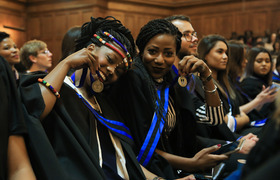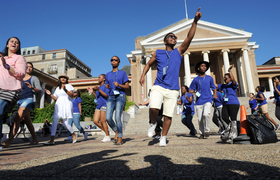Sax Appeal - the VC speaks
02 March 2009This year's edition of Sax Appeal, the annual UCT Rag publication produced by students, has elicited widespread reaction and debate. I feel it important to share our position on the issues raised.
This year's edition elicited an outcry from many people - including many Christians - objecting strongly to a feature on pages 84 and 85 offering possible retorts for an atheist to certain imagined questions from Christian fundamentalists contained in 10 picture comic frames. Some also objected to a Zapiro cartoon, and to other statements in the magazine.
Following an intense discussion and interrogation of the content on the two pages in question, the RAG chairperson apologised unreservedly to those offended by aspects on these two pages. As Vice-Chancellor of UCT, I expressed a view that the apology was indeed appropriate and I added my own apology, expressing regret at its publication.
Both apologies are an acknowledgement that aspects of the two pages were offensive, hurtful and disrespectful, particularly to Christians.
The magazine as a whole is not in question and I regret to say that some people who complain about the general quality admit that they have not read it! There are excellent offerings in it. I believe the magazine is a good one - a typical student offering of satire and humour.
The RAG magazine has been produced by students since the early 1930s and sold to support an excellent cause - the Students' Health and Welfare Centres Organisation (SHAWCO). The popularity and appeal of Sax Appeal has always been through being provocative, irreverent, funny, satirical and often silly.
I have no doubt that - as is typical in most years - the content will elicit varied responses from different people, from being thoroughly enjoyed to being seen as boring or juvenile.
However, an upsetting number of emails received were insulting in the extreme, even threatening the lives of UCT staff members and insulting individuals in the most grotesque, vitriolic personal attacks. Many have demanded that I discipline the students and institute controls to prevent this happening again. This is regrettable and dangerous, not just for the individuals being threatened, but for society, because such behaviour threatens freedom of speech more generally.
The RAG magazine is produced by a student editorial team that holds editorial independence. Prior to finalisation, the magazine is submitted to an editorial advisory board that includes staff members. Its role is to advise on content and other issues relating to the magazine. The emphasis is on advice. It is not - and never should be - the role of the editorial advisory board to edit or censor the content.
For the future, we will strengthen the seniority and weight of academic input into the editorial advisory board.
At UCT we believe the independence of the students is in itself contributing to the learning experience and we expect them to take responsibility and to work independently. If, as a result, an error occurs or problems arise, the students have to accept the consequences and we trust they learn from the experience.
In addition to the response from a segment of the community who were offended and wished to see future censorship, there have also been letters in the press questioning whether UCT should have apologised at all, arguing that this hints at self-censorship and concedes to limitations on freedom of speech.
UCT has a proud history of defending freedom of speech. Democracy and political freedom cannot exist if people are not free to express any views and beliefs they have. Furthermore, if this freedom were to be in any way restricted based on the content of the views expressed, it would require some authority to decide which views are unacceptable to society. But how can we trust such an authority not to pursue its own interests, or even with benign intention, to know what is best for all of us, particularly when we are prevented from hearing dissident views. So we tolerate the dangers of ill-informed views, lies, untruths, offensive comments, socially divisive propositions being given public hearing because we cannot trust anyone to hold the monopoly on truth. The evidence suggests that progress is better served through the market place of competing ideas.
A university must defend free speech and enquiry even more vigorously than society in general for it is the basis of our pursuit of truth, and discovery and analysis. The danger of a religious authority prohibiting the expression of views that offend it is nowhere more clearly demonstrated than in the classic conflict between Galileo and the Church-ruled establishment, for whom the proposal that the earth and humanity were not the centre of the universe was heretical and led to his detention.
For all these reasons, this freedom of speech is a constitutionally protected right. Why then would I have discouraged the publication of the picture comic frames, and why have I apologised for them?
Because no freedoms are absolute. The freedom of speech may be limited under certain circumstances. Hate speech is a recognised limitation. So is defamatory speech. In the case of these picture comic frames, they are not hate speech, nor defamatory - but they are gratuitously offensive; they insult people of a particular faith and they insult their God.
If these statements were made in the course of a satirical article, or a political argument, in the pursuit of 'truth' or for the benefit of advancing a view on religion in general or a particular belief system - the offence caused could still be justified. But if they are simply the stuff of a joke at another's expense through ridiculing the other, making a whole group of people out to be stupid, it communicates intolerance of diversity, a lack of respect for every individual's innate dignity which is the foundation of our whole system of equal human rights.
The consequence of these statements is to offer a few laughs for some at the expense the dignity of others. It also has the consequence of causing social division and conflict. While this in itself is not an argument for censorship, it must weigh against making such statements if no positive purpose can be shown to be served. There is no other utility. So the negative social and individual consequences outweigh the positive. But that is a reason for being more considerate and not publishing them, it is not a reason for censorship, the practice of which would be far more negative in the greater scheme of things.
At UCT we welcome different views. Ideally they are expressed in a respectful manner.
I would like to make clear that UCT will not discipline the students involved nor will we censor the magazine in the future. We will ensure that the editorial advisory board play their role appropriately. And we will ensure that our students understand that with every right - also that of expressing oneself - comes a responsibility.
Anyone wanting to comment is welcome to write to saxappealcomments@uct.ac.za. We value your views and learn from them.
Downloads
Dr Max Price
Vice-Chancellor
 This work is licensed under a Creative Commons Attribution-NoDerivatives 4.0 International License.
This work is licensed under a Creative Commons Attribution-NoDerivatives 4.0 International License.
Please view the republishing articles page for more information.










